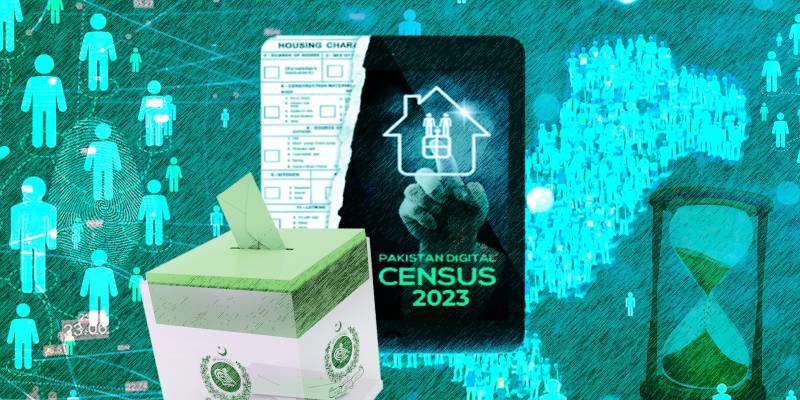
As the country nears a decisive phase prior to the general elections, the Election Commission of Pakistan has shared a draft of the code of conduct for the electoral campaigns by political parties, with clauses to ensure clean and 'equal' campaigning.
The commission is also likely to finalise the election schedule after taking input from all political parties in a final round of consultative parleys. The elections regulator kicked off this phase by sharing a draft of the code of conduct for upcoming general elections with the political parties.
The second and final round of consultations between the top election regulatory authority and political parties is set to commence on October 4. 2023.
Background discussions with members of political parties revealed that most parties, except for the PML-N, are likely to put forward the same stance: there should be unnecessary no delay in polls.
Earlier, in the first round of consultative meetings between leaders of political parties and the top election body, the former attempted to convince the latter to hold general elections within 90 days from the date of dissolution of the assemblies, as listed in the Constitution.
But the commission poured cold water on that when it announced that the delimitation exercise was mandatory before the election schedule could be announced and that this exercise would not be completed before December 14, 2023. However, after consultations with the political parties, the ECP decided to shave off 14 days from this estimate and set November 30 as the new deadline to complete the delimitation process.
Clean polls
According to the draft of the code of conduct shared with political parties, a copy of which is also available with The Friday Times, it includes 88 clauses that regulate the behaviour of parties, candidates and government officials, elected lawmakers and caretaker government officials.
One key clause in the code of conduct reads that political parties shall not propagate any opinion or act in any manner prejudicial to the ideology of Pakistan, or the sovereignty, integrity or security of Pakistan, or the integrity or independence of the judiciary of Pakistan, or which defames or brings into ridicule any government institution including the judiciary and the Armed Forces of Pakistan.
Background discussions with political and constitutional experts showed that this is a standard clause inserted in the code of conduct for every election and that there was nothing new in it. But the move to share it proved that there is a forward motion on general elections being held.
However, some believe this clause will be critical in the upcoming election season, given the country's political temperature against the establishment and various arms of the state, especially the military and the judiciary.
A few days ago, Pakistan Muslim League-Nawaz (PML-N) supremo Nawaz Sharif, in a statement from his office in London, United Kingdom, demanded accountability of retired military officials and judicial officers, including former chief justices as he blamed them for interference and of being responsible for the mess the country currently finds itself in.
Further afield, the Pakistan Tehreek-e-Insaf (PTI) has built a movement based on its anti-establishment narrative, culminating in the May 9 incidents.
Moreover, the code of conduct revealed that political parties, contesting candidates and election agents should, at all times, uphold the rights and freedom of the people of Pakistan as guaranteed by the Constitution and law.
"Public office holders including the president, prime minister, chairman/deputy chairman senate, speaker/deputy speaker of an assembly, federal ministers, ministers of state, governors, chief ministers, provincial ministers and advisors to the prime minister and the chief minister, mayor/chairman/Nazim, their deputies, shall not participate in election campaigns in any manner whatsoever," the code of conduct declared categorically.
The clause added that this provision would equally apply to the caretaker setups in the federal and provincial units.
However, elected members of the Senate and local government are allowed to participate in the election campaign but will face strict conditions for doing so.
"They will strictly abide by the code of conduct, directions, instructions, and regulations issued by the election commission of Pakistan, and violations thereof shall entail legal consequences including contempt proceedings as contemplated in Section 10 of the Elections Act, 2017," the draft read.
It added, "There shall be a complete ban on convening, holding or attending any public meeting, or promoting or joining in any procession, within the area of a constituency during a period of 48 hours, and violation will be treated as an illegal practice."
The code of conduct called on political parties to first ensure a level playing field within their ranks.
"The political parties shall provide equal opportunity to its qualified members, both men and women, to participate in electoral processes and, while making the selection of candidates on general seats in an assembly, the party shall ensure at least five percent representation of women candidates as required under Section 206 of the Act."
It is pertinent to mention here that major political parties have started blaming each other. Pakistan Peoples Party (PPP) Chairman Bilawal Bhutto Zardari has repeatedly expressed his reservations regarding the unavailability of a 'level playing field'.

